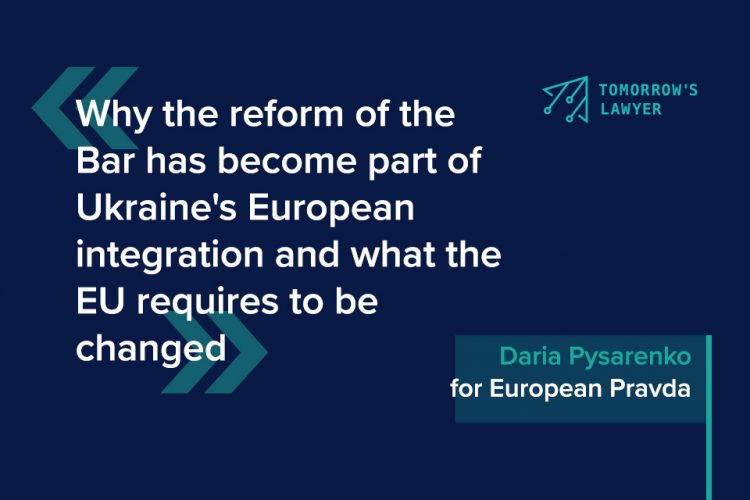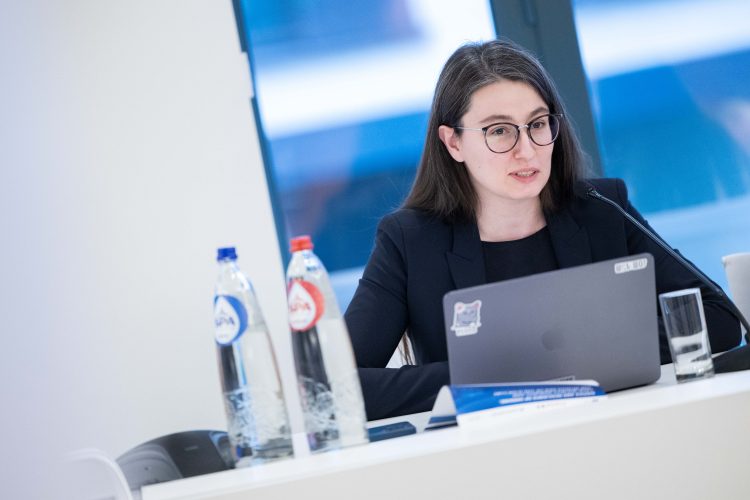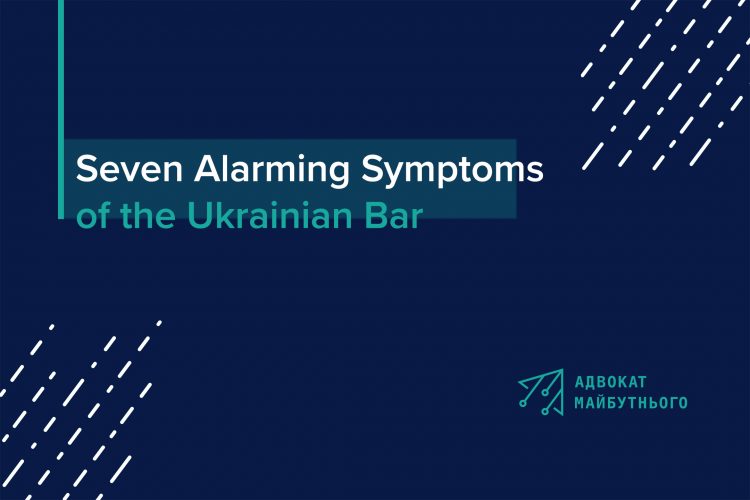
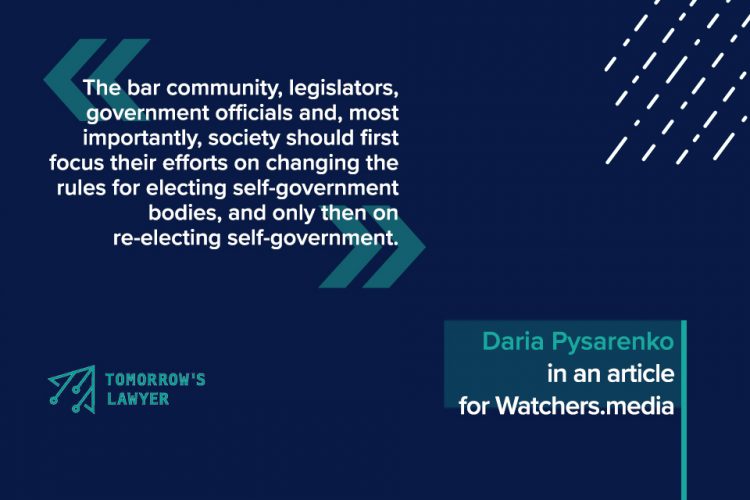

Reform of the Bar: why judicial reform will never be complete without it
Daria Pysarenko, Director of Tomorrow`s Lawyer
specially for Watchers.media
Reform of the judicial system is impossible without reform of the Bar, which since 2016 has been part of the justice system under the Constitution and influences its accessibility, quality, effectiveness and legitimacy. Externally, the crisis in the legal profession is manifested, in particular, in the absence of delegates to the High Council of Justice and the Qualification and Disciplinary Commission of Prosecutors, which the Bar Association is required to do under its constitutional duties.
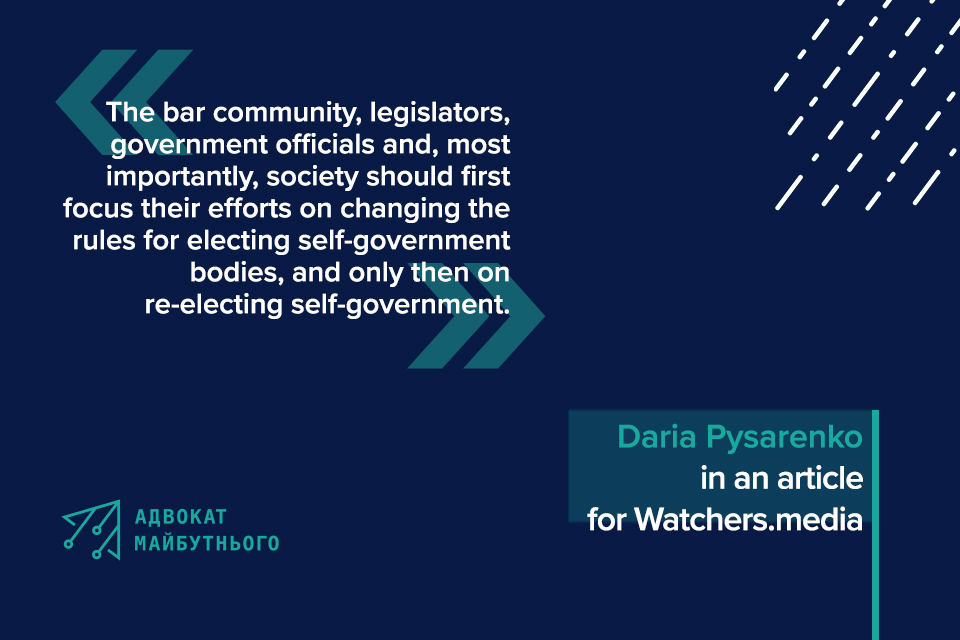 Alongside this, there is another worrying and paradoxical trend: the bar community currently resembles a hostage to its own self-government. The term of office of the bodies of the bar self-government has long expired: for more than three years, these structures have been operating without legitimate re-election. This calls into question their authority not only among lawyers themselves, but also in the eyes of other participants in the justice system – judges and prosecutors. International partners have also drawn attention to this problem.
Alongside this, there is another worrying and paradoxical trend: the bar community currently resembles a hostage to its own self-government. The term of office of the bodies of the bar self-government has long expired: for more than three years, these structures have been operating without legitimate re-election. This calls into question their authority not only among lawyers themselves, but also in the eyes of other participants in the justice system – judges and prosecutors. International partners have also drawn attention to this problem.
It should be recalled that both judges and prosecutors elected their self-government bodies for the period 2022-2025. Prosecutors even managed to do so twice. Their election system, incidentally, is the closest to the system for electing self-government bodies for lawyers.
However, it is important to emphasise that expired powers and other problems are not the cause, but the consequence of a systemic problem – a closed, unaccountable and, in fact, uncontrollable model of self-government established by the 2012 Law on the Bar Association and the Practice of Law.
More than ten years of experience in implementing this law have shown that the mechanisms built into it create opportunities for abuse, along with a lack of checks and balances. Today, lawyers and society are reaping the fruits of these dysfunctions, from a loss of trust in self-government bodies to the stalling of strategic changes in the justice system as a whole.
That is why reforming the Bar Association is no longer an internal matter for the professional community. It is a prerequisite for the functioning of justice as such. And until this knot is untied, talk of completing judicial reform will remain nothing more than declarations.
The issue of reforming the Bar is gradually being reflected in strategic documents shaping Ukraine’s justice policy in the context of European integration. This is in line with the recommendations of the European Commission, in particular those set out in the annual reports within the EU Enlargement Package for 2023 and 2024, where the Bar Association is recognised as a key institutional element in ensuring access to justice, the rule of law and the effective functioning of the market economy.
Relevant recommendations are also contained in the Roadmap on the Rule of Law, approved by the Cabinet of Ministers of Ukraine (p. 24), which explicitly refers to the need to improve the transparency, accountability and effectiveness of the self-regulation of the legal profession, as well as to improve mechanisms for access to the profession and disciplinary responsibility of lawyers.
In turn, the Office of the President of Ukraine is developing a Strategy for the Development of the Justice System until 2029, in which a section will be devoted to the reform of the Bar.
It is obvious that the very mention of the Bar Association in government and presidential strategies is evidence of a critical state of affairs. Under normal conditions, the reform of a self-governing institution should not be initiated by the state. The fact that today it is the EU, the Government and the Office of the President that are actually setting the direction for change in this area is a very worrying symptom. However, this situation has only become possible because self-government has lost its ability to self-clean, blocked internal mechanisms for renewal and escaped the real control of the bar community.
The independence of the Bar Association is a necessary condition for the functioning of the rule of law. At the same time, independence is not the antonym of transparency, accountability and responsibility. On the contrary, true independence is based on self-regulation, and self-regulation implies accountability to the bar community and openness to society, in whose interests the Bar Association acts as an integral institution of justice. The creation of an effective system of transparent, accountable and responsible self-government is the key objective of the strategic documents that currently form the framework for state policy in the field of justice.
In a situation where the current model of self-government has lost its ability to renew itself from within, legislative changes remain the only legitimate and effective tool for transformation. It is the parliament, as the direct representative of society, that has the power and responsibility to lay down new principles for the functioning of the Bar Association, taking into account EU recommendations, democratic procedures and the expectations of lawyers and society regarding the functioning of the Bar Association.
At the same time, it is important to understand that the Bar Association is a self-governing institution. The law should not replace internal regulation. On the contrary, legislation can and should remain a framework, outlining general principles, values and approaches, while providing self-government with space for autonomous development.
However, there is one critically important exception. The only thing that definitely needs to be updated and detailed (taking into account negative experience) in the law is the rules for electing self-government bodies of the bar. After all, it is these bodies that ultimately make decisions on how the Bar Association will function. That is why it is not just their composition that is crucial, but also the way they are formed – through a democratic, transparent and competitive election process that guarantees representation and trust. Without this, there can be no accountability, legitimacy or self-regulation as such.
How could elections to the bar self-government bodies take place if they were held now under the current law and, for the most part, under the current acts of the bar self-government bodies?
The key to getting started is in the hands of the Bar Council of Ukraine. Even if the powers of regional bar councils or the Qualification and Disciplinary Commission have expired in a region, elections cannot take place without a decision by the Bar Council of Ukraine (BCU) to hold a conference. Despite the fact that the system is formally structured at the regional and national levels, all key decisions regarding the electoral system are concentrated in the hands of the Bar Council of Ukraine (BCU). It is the BCU that determines:
· when and where to hold regional bar conferences;
· how many delegates can be elected at these conferences;
· the rules according to which these delegates are to be nominated and elected.
In other words, the start of any election process is entirely in the hands of the BCU. If the BCU does not approve the quota or set a date for the conference – even when its powers have clearly expired – the region’s bar community can do nothing. In other words, the first barrier is the centralised licensing “window” for elections.
The centralised model enshrined in the Law may complicate the renewal of bodies, lead to delays in electoral processes and limit opportunities for democratic initiatives from below. Since 2022, when regular elections were supposed to take place at both the regional and central levels, the current central-level bodies of lawyer self-government have declared that it is impossible to hold them and have extended their powers until a new composition is formed, which will take place at an unknown date, and thus continue indefinitely. As a result, for more than three years, the Bar has remained the only judicial body with self-government bodies whose legal term of office has expired.
Centralisation affects not only elections but also accountability: regional councils are formally controlled by conferences, but these conferences cannot take place without the approval of the BCU. Similarly, control over finances, admission to the profession and disciplinary procedures is removed from the effective control of the lawyers themselves, whom this system is supposed to serve.
Another profound flaw in the current model of bar self-government is the excessively long term of service in leadership positions, which effectively prevents real rotation.
The law provides that the maximum term of service in the bodies of bar self-government is two terms of five years, i.e. ten years in total. However, even this limit is ignored: currently, a significant number of members of the self-government bodies have been in leadership positions for almost 13 years. This is particularly worrying given that the principle of regular change of leadership is a fundamental principle of good governance enshrined in many international documents.
In most European countries, the term of office in bar associations is limited to one to three years, which ensures:
· constant renewal of ideas and approaches;
· the return of lawyers to practice after their term of office;
· the avoidance of personalisation of power.
This is logical: lawyer self-government is a temporary representation, not a career service. While a lawyer is in office, he or she is usually removed from regular, everyday practice. Returning to the profession after a decade in administrative structures is no easy task. Therefore, time limits are not a technicality but an essential guarantee of effective self-government.
It is therefore all the more surprising to hear representatives of the Bar Councils of Ukraine calling for the removal of even the existing two-term limits. In particular, during a round table on 6 June 2025, a member of the Bar Council of Ukraine in her speech directly admitted the possibility of “improving the Bar through, in particular, the abolition of the two-term limit”. This approach contradicts both European standards and the basic logic of self-government. Real renewal is only possible when the rules promote change and do not create conditions for unlimited stays in power.
Another systemic problem remains the quota mechanism – determining the number of delegates that regions can elect to participate in conferences and the Bar Association Congress. As a result, it is the Bar Council of Ukraine that decides how many representatives from each region will participate in the elections of the Bar leadership and, accordingly, retains leverage over the formation of electoral conferences. Clearly, the quota mechanism violates the basic principle of equal voting rights for every lawyer in elections to self-government bodies.
The example of the Bar Council’s decision on quotas in 2017 shows that quotas are based on the number of lawyers (1 delegate per 100 persons). This is a good time to analyse the quantitative composition of lawyers by region for 2012-2024 (data set). The analysis reveals unexpected imbalances. Looking at the number of lawyer certificates issued, the top five are Kyiv region, Poltava region, Odessa region, and zakarpattia region. The city of Kyiv ranks only seventh.
The situation is even more interesting when comparing the number of certificates issued per 100,000 population. According to this indicator, Kyiv region, Poltava and Zakarpattia regions rank first in terms of the number of certificates in 2012-2024. In fact, regions with far from the largest populations (Zakarpattia and Poltava) have the highest concentration of lawyers, even ahead of the capital. The reasons for this situation are related to the fact that it is in these regions that ‘industrial conveyor belts’ for issuing lawyer certificates actually operate, and they deserve separate analysis and coverage.
This disproportion and the quota system itself turn elections into an instrument of administrative control rather than a manifestation of the free will of the professional community.
Another systemic flaw in the current electoral model is the open voting of delegates during the formation of self-government bodies. At regional bar conferences and the Ukrainian Bar Congress, voting takes place publicly, by a show of hands or by ballot.
This is not just a technical detail. Open voting creates conditions for pressure from management or influential groups, deprives delegates of their autonomy, as they are forced to demonstrate their loyalty publicly, and discredits the very idea of the electoral process as a mechanism for the free and impartial formation of representative bodies.
It is particularly telling that other self-governing institutions in the field of justice – in particular, prosecutorial self-government bodies – have a rule directly provided for by law on secret voting when electing self-government bodies. This is a European standard based on the principles of internal democracy, equality and freedom of choice. Open voting for the composition of the OAC not only contradicts common sense, but also undermines trust in the election process itself. Without secret voting, it is impossible to ensure honesty, independence or real change in the composition of self-government bodies. This is not a coincidence, but a deliberate construct that establishes an open, controlled format as the standard. At the same time, if we are not talking about voting for the members of local government, but about decisions made by already elected members of local government, then, on the contrary, open voting should be used as a manifestation of their accountability to the professional community.
That is why it is extremely important to initiate changes at the legislative level that will transform the system of electing self-government bodies in accordance with the principles of democracy, transparency, competition and accountability, and only then hold elections:
1. Granting real rights to lawyers at the regional level, and not just to the central body, to initiate elections in order to unblock the possibility of natural self-government ‘from below’.
2. Establishing the principle of ‘one lawyer = one vote’ instead of the current quota system to ensure equal voting rights for all lawyers.
3. Introduce online voting tools to increase accessibility, save money and enable greater participation of lawyers in the electoral process. The Bar could be the first institution in the justice system to implement this. (Moreover, the Bar has more than enough resources for this, if we calculate the amount of annual contributions made by lawyers for the implementation of lawyer self-government accumulated in the accounts of the UNBA).
4. Legislative enshrinement of mandatory secret voting in the election of self-government bodies as a basic guarantee of freedom of expression.
5. Establishment of clear rules for a transparent and competitive procedure for nominating candidates: the possibility for lawyers to independently submit their candidacies for election, public announcement of the competition, publication of programmes, access to information, holding debates, etc.
6. Reduction of the maximum term of office in theself-government bodies from five to a maximum of three years, in line with European standards and the principle of rotation.
The development of a new electoral model must take place with the mandatory participation of lawyers themselves as the source of professional self-government. At the same time, only Ukrainian lawyers should be included in this model as participants in the process of forming self-government bodies, without the involvement of representatives of other professions or other states, which will be a manifestation of the independence of the Bar.
This sequence of changes is necessary to restore trust in self-government bodies and elect legitimate representatives of the bar community who are capable of working in the interests of the profession and society.
That is why I find calls for the immediate holding of conferences and a bar association congress under the current rules incomprehensible. In this format, it will not yield any results except for the reproduction and further preservation of the old flawed model. After all, the representatives of lawyers elected in such a process will be formed by procedures with signs of an undemocratic path – without real competition, transparent procedures and secret voting – and will receive powers for at least five years. Most likely, this will mean another cycle without change.
That is why the bar community, legislators, government officials and, most importantly, society should firstfocus their efforts on changing the rules and only then on voting. I understand the importance of delegating representatives to the High Council of Justice and the Qualification and Disciplinary Commission of Prosecutors as soon as possible. Butspeed cannot be more important than quality. The bar community has a chance not just to ‘launch’ the system, but torestart it on new, democratic foundations – and this chance cannot be ignored.
